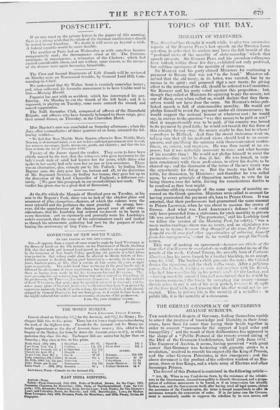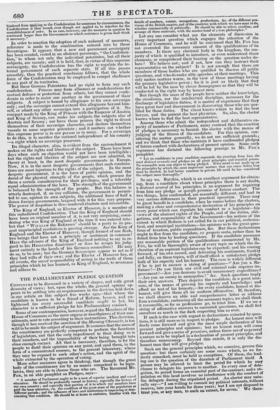THE GERMAN CONSPIRACY OF SOVEREIGNS AGAINST SUBJECTS.
THE confederated despots of Germany, finding themselves unable to arrest the progress of knowledge and liberality in their domi- nions, have been for some time laying their heads together in order to concert "measures for the support of legal order and tranquillity ,-" and the result of their deliberations has appeared in the shape of a "Public Protocol of the twenty-second sitting of the Diet of the Germanic Confederation, held 28th June 1832." The Emperor of Austria, it seems, having perceived "with great sorrow that Germany was hastening with gigantic strides to a revolution," resolved to consult. his august ally the King of Prussia, and the other German Potentates, in this emergency; and the above document is the product of the collective wisdom of an Em- peror, three or four Kings, and a whole army of Electors and other Sovereign Princes.
The kernel of this Protocol is contained in the following article— "Art. %. When in any Confederate State, by the resistance of the inhabit- ants to the Government, internal tranquillity is directly threatened, and a propa, gation of seditious movements to be feared, or if an insurrection has actually broken out, and the Government itself, after having tried all legal means, claims the assistance of the Confederation, the latter is bound immediately to or ifs assistance towards the restoration of order. If in the latter case the Govern- ment is notoriously unable to suppress the rebellion by its own means, and hindered from applying to the Confederation for assistance by circumstances, the details of numbers, extent, occupations, productions, 8ce, of the different pro.. Confederation is then bound, even though net applied to, to interfere for the , vinces of the British empire, and of the countries with which we have most to do, reestablishment of order. In no case, however, can the measures in question be ' whether commercially or politically. He should be able to select, combine, and continued longer than the Government to which assistance is given shall think arrange all these materials, with the master-hand of a true philosopher."
it necessary."
In order to sanction the adoption of such unheard of measures, reference is made to the combination entered into by these Sovereigns. It appears that a new and paramount sovereignty has been created, vested in an abstract personage, "the Confedera- tion," to whom not only the individual potentates, but all their subjects, are vassals • and it is held, that, in virtue of this supreme sovereignty, the Confederation has the right to regulate the in- ternal government of each separate state. If all this passes smoothly, then the practical conclusion follows, that the whole force of the Confederation may be employed to compel obedience in any part of its territories. But these German Potentates had no right to form any such confederation. Princes may form alliances or confederations for mutual defence or protection from others, but they cannot confe- derate in order to assist one another in the government of their subjects. A subject is bound by allegiance to his own sovereign only; and the sovereign cannot extend this allegiance beyond him- self, or admit any other sovereign into a participation of it. No compact made by the King of Prussia with the Emperor of Austria and King of Saxony, can make his subjects the subjects also of Austria and Saxony; nor have those princes the right to divest themselves of their sovereign character, and declare themselves vassals to some superior potentate ; and it matters not whether this supreme power is in one person or in many. For a sovereign to do this, is to sacrifice the national independence of his country —a right which no sovereign possesses.
Its illegal character, also, is evident from the encroachment it makes on the rights and liberties of the subject. There have been days when such an objection would not have been intelligible; but the rights and liberties of the subject are now admitted, in theory at least, in the most despotic governments in Europe. Now, it is in the most despotic governments that such combina- tions are most injurious to the rights of the subject. In the most despotic government, it is the force of public opinion, and the dread of the physical strength of the people, which procure for them a certain consideration for their privileges, and a tolerably equal administration of the laws. The strength of the government is balanced by the strength of the people. But this balance is utterly destroyed, if, on any collision, the government is permit- ted to use, against its own subjects, the additional force of half a dozen foreign governments, leagued with it for this very purpose. The power of despotism is thus rendered absolute and irresistible.
The King of England, as Elector of Hanover, is a member of this unhallowed Confederation. That the King of England should have been an original member of it, is not very surprising, consi- dering who was King of England at the time it was entered into: but that "WILLIAM the Reformer" should be a party to its pre- sent unprincipled resolutions is passing strange. Are the King of England and the Elector of Hanover, though formed of one flesh, two beings that have not a principle or sentiment in common? Have the advisers of the King of England nothing to say in re- gard to his Hanoverian dominions? or does he resign his judg- ment entirely to the hands of his German counsellors? He may do so, to be sure; but the German Sovereigns appear to act as if they had wills of their own; and the Elector of Hanover has, at all events, the moral responsibility of acting in the teeth of those principles which he has learned, as King of England, to reverence and adhere to.




























 Previous page
Previous page